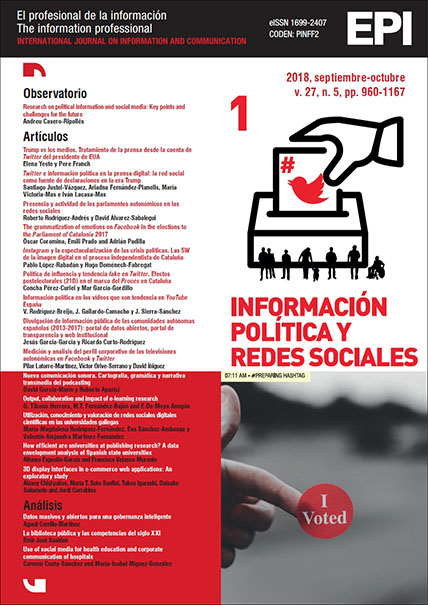The public library and the skills of the XXI century
DOI:
https://doi.org/10.3145/epi.2018.sep.17Keywords:
Public libraries, Competencies, Skills, Librarians, Library personnel, Library staff, Public, Readers, Services, Needs, Information society, Evolution, Development, Library policy.Abstract
Since the beginning of the XX century, public libraries have been contested. Initially, the biggest criticism was focused on those libraries which seemed a book deposit, and how they could cooperate to the development of the industrial society and also, afterwards, the post-industrial society. With the coming of the information society, new challenges came up, like the transformation from the print to digital, the training of readers... New skills were demanded to librarians to overcome these challenges. Since their first years of existence, libraries have been understood as temples of knowledge and truth. Nowadays, political, economic and ideological interests support the post-truth crisis, over abundance of information, manipulation of the information and fake news. Within this context, identification and development of information skills has become essential. Moreover, it is a duty of public libraries to create the conditions to satisfy the new demands of the information & knowledge society. Based on comparative studies, a bibliographic review and qualitative methodologies, this article analyzes the community divide, the reading mediation, the information skills, both the return on investment (ROI) and the social return on investment (SROI), and to demonstrate how the new model of public library is able to cope with the needs of the XXI century´s citizens.
Downloads
References
Albagli, Sarita; Maciel, Maria-Lucia; Abdo, Alexandre-Hannud (2015). Ciíªncia aberta, questíµes abertas. Brasília, Ibict, Rio de Janeiro, Unirio. http://livroaberto.ibict.br/bitstream/1/1060/1/Ciencia%20aberta_questoes%20abertas_PORTUGUES_DIGITAL%20%285%29.pdf
Bandino, Simona (2000). "Prefacio". In: El público y la biblioteca: metodologías para la difusión de la lectura. Gijón: Ediciones Trea, 2000. ISBN: 84 95178 84 2
Barreto, Aldo-de-Albuquerque (1994). "A questí£o da informaí§í£o". Sí£o Paulo em perspectiva, Sí£o Paulo, v. 8, n. 4, pp. 3-8. http://bogliolo.eci.ufmg.br/downloads/BARRETO%20A%20Questao%20da%20Informacao.pdf
Borges, José-Luis (1962). The library of Babel. Labyrinths: Selected stories and other writings. Penguin, Harmondsworth. ISBN: 978 0 8112 1699 9
Brusamolin, Valério; Suaiden, "ŽEmir-José (2014). Aprendizagem organizacional: o impacto das narrativas. Editora Appris. ISBN: 85 81924646
Cardoso, Fernando-Henrique; De-Oliveira, Miguel-Darcy; Fausto, Sergio (2018). Crise e reinvení§í£o da politica no Brasil. Sí£o Paulo, Companhia das Letras. ISBN: 978 85 35930986
Castillo, Toni (2018). "El tecnólogo que predijo las "˜fake news´ cree que lo siguiente será un apocalipsis informativo". Genbeta, 15 febrero. https://www.genbeta.com/seguridad/el-tecnologo-que-predijo-las-fake-news-cree-que-lo-siguiente-sera-un-apocalipsis-informativo
Castro, César-Augusto; Ribeiro, Maria-Solange-Pereira (1997). "Sociedade da informaí§í£o: dilema para o bibliotecário". Transinformaí§í£o, v. 9, n. 1, pp. 17-25. https://seer.sis.puc-campinas.edu.br/seer/index.php/transinfo/article/download/1589/1561
D´Elia, George (1980). "Development and testing of a conceptual model of public library user behavior". The library quarterly, v. 50, n. 4, pp. 410-430. https://doi.org/10.1086/601016
Freire, Paulo (1988). A importí¢ncia do ato de ler: em tríªs artigos que se completam. Cortez Editora. ISBN: 978 85 24916465 http://perio.unlp.edu.ar/catedras/system/files/la_importancia_del_acto_de_leer.pdf
Kliksberg, Bernardo (1994). Pobreza, uma questí£o inadiável: novas respostas a nivel mundial. Brasília, DF: Fundaí§í£o Escola Nacional de Administraí§í£o Pública; Enap. ISBN: 978 9806125223
Kliksberg, Bernardo (2000). Desigualdade na América Latina - o dialogo adiado. Sí£o Paulo. Cortez Editora. http://unesdoc.unesco.org/images/0013/001308/130860PORb.pdf
Kotler, Philip (2017). My adventures in marketing: The autobiography of Philip Kotler. Idea Bite Press. ISBN: 978 0 9905767 7 8
Lins, Ivana-Aparecida-Borges (2016). Biblioteca pública, convergíªncias e divergíªncias: Chile, Colí´mbia e Brasil. Salvador, 198 pp. Tese (doutorado em Ciíªncia da Informaí§í£o), Programa de pós-graduaí§í£o em Ciíªncia da Informaí§í£o-PPGCI/Universidade Federal da Bahia-UFBA, Orientadora: De-Carvalho, Kátia. https://doi.org/10.9771/rpa.v11i2.24917
Madden, Michael (1979). "Lifestyles of library users and nonusers". Occasional paper n. 137, University of Illinois Graduate School of Library Science, 1-73. https://www.ideals.illinois.edu/bitstream/handle/2142/3950/gslisoccasionalpv00000i00137.pdf
Manguel, Alberto (2002). "La lectura electrónica es casi contraria a la lectura misma. Entrevista". Javier Rodríguez-Marcos. El país, 10 enero. https://bit.ly/2MB8Qp3
Morín, Edgar (2002). Introducción a una política del hombre. Barcelona: Gedisa. ISBN: 978 84 74329 02 5
Niskier, Arnaldo (2014). "Novos trajetos de leitura". Correio Braziliense, Brasília, DF, 29 mar. 2014. http://www.academia.org.br/artigos/novos-trajetos-de-leitura
Osakabe, Haquira (1982). "Consideraí§íµes em torno do acesso ao mundo da escrita". In: Regina Zilberman (org.). Leitura em crise na escola: as alternativas do professor. Porto Alegre, Mercado Aberto.
Pacheco, Leila-Maria-Serafim (1995). "Informaí§í£o enquanto artefato". Informare: Cadernos do Programa de Pós-graduaí§í£o em Ciíªncia da Informaí§í£o, Rio de Janeiro, v. 1, n. 1, pp. 20-24. http://www.brapci.inf.br/index.php/article/view/0000003099
Pondé, Glória-Maria-Fialho (2000). Leitura e cidadania. Proler, Rio de Janeiro: Biblioteca Nacional.
Takahashi, Tadao (2000). Sociedade da informaí§í£o no Brasil. Livro verde. Programa Sociedade da Informaí§í£o (SocInfo). https://www.governodigital.gov.br/documentos-e-arquivos/livroverde.pdf
Downloads
Published
How to Cite
Issue
Section
License
Dissemination conditions of the articles once they are published
Authors can freely disseminate their articles on websites, social networks and repositories
However, the following conditions must be respected:
- Only the editorial version should be made public. Please do not publish preprints, postprints or proofs.
- Along with this copy, a specific mention of the publication in which the text has appeared must be included, also adding a clickable link to the URL: http://www.profesionaldelainformacion.com
- Only the final editorial version should be made public. Please do not publish preprints, postprints or proofs.
- Along with that copy, a specific mention of the publication in which the text has appeared must be included, also adding a clickable link to the URL: http://revista.profesionaldelainformacion.com
Profesional de la información journal offers the articles in open access with a Creative Commons BY license.




